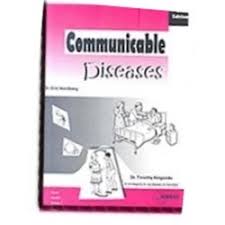This manual covers the full range of communicable diseases in the African region: skin infections, malaria and other vector-borne diseases.
communicable diseases
KSh 3,000.00
This manual covers the full range of communicable diseases in the African region: skin infections, malaria and other vector-borne diseases.
5 in stock
Related products
-
The Global Family Planning Revolution: Three Decades of Population Policies and Programs (Moving Out of Poverty) Paperback
KSh 7,000.00The striking upsurge in population growth rates in developing countries at the close of World War II gained force during the next decade. From the 1950s to the 1970s, scholars and advocacy groups publicized the trend and drew troubling conclusions about its economic and ecological implications. Private educational and philanthropic organizations, government, and international organizations joined in the struggle to reduce fertility. Three decades later this movement has seen changes beyond anyone’s most optimistic dreams, and global demographic stabilization is expected in this century.
‘The Global Family Planning Revolution’ preserves the remarkable record of this success. Its editors and authors offer more than a historical record. They disccuss important lessons for current and future initiatives of the international community. Some programs succeeded while others initially failed, and the analyses provide valuable guidance for emerging health-related policy objectives and responses to global challenges.
-
A Complete Hospital Manual of Instruments and Procedures Paperback
KSh 8,400.00Infection Control, Sterilization and Care of Surgical Instruments Electrical Instruments―Laser, Cryoprobes, Ultrasonic Equipments The OR Complex, Its Management and Operation Table Anesthesia Equipment and Anesthetics Ligature and Suture Materials Operating Microscopes Endoscopy General Surgical Instruments General Surgical Sets and Procedures Gynecological and Obstetric Sets and Procedures Urologic Sets and Procedures Endocrine Surgery Procedures Orthopedic Instruments Sets and Procedures Ophthalmic Instruments and Procedures Dental Instruments and Procedures Ear, Nose & Throat Instruments and Procedures Neurosurgical Instruments and Procedures Plastic Surgery Instruments and Procedures Thoracic Instruments and Procedures Cardiovascular Instruments and Procedures Pediatric Surgery Procedures and Instruments Imaging Procedures and Equipment Plaster of Paris (POP) Technique New Emerging Techniques Appendices I to VI
-
Wong’s Nursing Care of Infants and Children 11th Edition
KSh 9,660.00Wong’s Nursing Care of Infants and Children, 11th Edition takes a unique, easy-to-follow developmental approach to describe the care of children at each age and stage of development. This longtime bestseller provides an evidence-based, clinical perspective that shows how the quality of nursing care can impact quality patient outcomes. Childhood diseases and disorders are organized by age groups and body systems and explained through the nursing process framework. This edition features completely updated and reorganized chapters that present content in a clear, easy-to-understand way. New Quality Indicator boxes paint a bigger picture of hospitals and how they look at quality and safety.
- A focus on family-centered care emphasizes the role and influence of the family in health and illness with a separate chapter and Family-Centered Care boxes.
- Emergency Treatment boxes serve as a quick reference in critical situations.
- Pathophysiology Reviews explain complicated disease processes with illustrated summary boxes.
- Quality Patient Outcomes are discussed for major childhood diseases and disorders, showing how nursing care directly impacts patient outcomes.
- Nursing Tips include helpful hints and practical, clinical information.
- Critical Thinking Case Studies help you test and develop your own analytical skills.
- Cultural Considerations provide cultural tips from clinical experts.
- Nursing Care Plans provide models for planning patient care, with rationales explaining why specific nursing interventions have been chosen, and include nursing diagnoses, patient/family goals, nursing interventions/rationales, expected outcomes, and NIC and NOC guidelines.
- Nursing Care Guidelines offer clear, step-by-step, detailed instructions on performing specific skills or procedures.
- Translating Evidence into Practice and Applying Evidence to Practice boxes help you apply research to support, guide, and improve the outcomes of nursing care.
- Atraumatic Care boxes contain techniques for care that minimize pain, discomfort, or stress, and provide guidance for performing procedures in a caring manner.
- Community and Home Health Considerations boxes focus on wellness information and illness-related topics.
- Drug Alerts highlight important drug-related information for safe, appropriate care.
- Nursing Alerts provides critical information that must be considered in providing care.
- Research Focus boxes emphasize research with concise reviews of important evidence.
- Nursing Alerts provides critical information that must be considered in providing care.
-
An Introduction to Forensic Genetics 1st Edition
KSh 12,600.00An Introduction to Forensic Genetics is a comprehensive introduction to this fast moving area from the collection of evidence at the scene of a crime to the presentation of that evidence in a legal context. The last few years have seen significant advances in the subject and the development and application of genetics has revolutionised forensic science.
This book begins with the key concepts needed to fully appreciate the subject and moves on to examine the latest developments in the field, illustrated throughout with references to relevant casework. In addition to the technology involved in generating a DNA profile, the underlying population biology and statistical interpretation are also covered. The evaluation and presentation of DNA evidence in court is discussed as well with guidance on the evaluation process and how court reports and statements should be presented.
- An accessible introduction to Forensic Genetics from the collection of evidence to the presentation of that evidence in a legal context
- Includes case studies to enhance student understanding
- Includes the latest developments in the field focusing on the technology used today and that which is likely to be used in the future
- Accessible treatment of population biology and statistics associated with forensic evidence
This book offers undergraduate students of Forensic Science an accessible approach to the subject that will have direct relevance to their courses. An Introduction to Forensic Genetics is also an invaluable resource for postgraduates and practising forensic scientists looking for a good introduction to the field.
-
Management Principles for Health Professionals
KSh 7,420.00Management Principles for Health Professionals is a practical guide for new or future practicing healthcare managers. The customary activities of the manager―planning, organizing, decision making, staffing, motivating, and budgeting―are succinctly defined, explained, and presented with detailed examples drawn from a variety of health care settings. Students will learn proven management concepts, techniques, models, and tools for managing individuals or teams with skill and ease.The Eighth Edition continues to present foundational principles of management in the context of contemporary health care. With timely coverage of such topics as medical cost sharing; use of robots; ER by appointment; increased use of observation units; renewed use of flextime staffing and scheduling; use of social media on the job, and more, this thoroughly updated text addresses the latest trends and issues that today’s health care manager is likely to encounter.Key Features- Presents 2 new tools ―The Manager’s Wheel Book and the Management Reference Portfolio ― to help new managers better understand their role and responsibilities and to aid existing managers in understanding their organization in detail- Covers managing care in a wide variety of health care settings (urgent care centers, specialty clinics, home care, etc.) outside of the traditional hospital setting.- Addresses technology and its impact, including eVisits/telemedicine, implementation of electronic health records, connectivity and the expectation that workers will respond during off hours via email and instant messaging, etc. – Offers expanded coverage on the importance and impact of corporate culture, the values of transparency and accountability, leadership style, and competitiveness.- Includes detailed examples of reports, plans, directives, union contracts, and more.
-
Health Care Information Systems: A Practical Approach for Health Care Management 4th Edition
KSh 15,000.00BESTSELLING GUIDE, UPDATED WITH A NEW INFORMATION FOR TODAY’S HEALTH CARE ENVIRONMENT
Health Care Information Systems is the newest version of the acclaimed text that offers the fundamental knowledge and tools needed to manage information and information resources effectively within a wide variety of health care organizations.
It reviews the major environmental forces that shape the national health information landscape and offers guidance on the implementation, evaluation, and management of health care information systems. It also reviews relevant laws, regulations, and standards and explores the most pressing issues pertinent to senior level managers. It covers:
Proven strategies for successfully acquiring and implementing health information systems.
Efficient methods for assessing the value of a system.
Changes in payment reform initiatives.
New information on the role of information systems in managing in population health.
A wealth of updated case studies of organizations experiencing management-related system challenges. -
OSCE in Obstetrics and Gynecology
This textbook is in accord with the motto of FOGSI which is dissemination of updated knowledge and education in the ever-expanding science of Obstetrics and Gynecology. It is a unique bank of practically based OSCE questions and answers based on the latest clinical guidelines which contains elaborative information in a very reader-friendly colorful layout. This book has been primarily written for undergraduate and postgraduate students to guide them in their preparation for their professional examinations. However, it will be a very handy and informative bank of knowledge, especially on the practical and clinical aspects of obstetrics and gynecology for all practitioners as well.
- This is a one-of-a-kind textbook purely based on the format of OSCE, i.e., Objectively Structured Clinical Examination stations, covering the fields of Obstetrics as well as Gynecology exhaustively.
- Liberal use of pictures and illustrations will not only aid the students in their preparation but also make the process of reading enjoyable.
- An exhaustive collection of chapters ranging from the basics of Obstetrics and Gynecology to recent advances like Endoscopy in Gynecology, Reproductive Medicine, and Imaging in Obstetrics.
- Topics like Fetal Ultrasound in First and Second Trimester, Screening and Congenital Malformations have been extensively covered with the help of images and illustrations making the topics simple and easy to understand.
- Liberty has been taken to provide detailed answers of some topics as well as pertinent references for further reading.
-
Kumar and Clark’s Clinical Medicine
KSh 17,470.00Now in its tenth edition, Kumar & Clark’s Clinical Medicine is fully updated and revised under a new team of editors.
Featuring new chapters covering:
o Diagnosis: the art of being a doctor – helping readers to develop a confident clinical method in interactions with patients
o Elderly medicine, frailty and multimorbidity
o Public health
o Surgery
o Evidence-based medicine
o Sepsis and the treatment of bacterial infection
o Haematological Oncology
o Venous thromboembolic disease
o Hypertension
o Men’s health
Enhanced clinical skills content has been added to most chapters – helping readers tailor history-taking and examination skills to specific specialty-based contexts.
Bonus online content – including self-assessment, common clinical and international cases, cardiovascular and respiratory audio material, clinical examination videos and bite-sized topic pages covering major conditions.
Heavily revised throughout with smaller chapters to ease navigation, added introductions and system overviews included for most chapters.Edited by Adam Feather, MBBS, FRCP, FAcadMEd; David Randall, MA, MRCP; and Mona Waterhouse, MA, MRCP. Contributors comprise consultants at the top of their fields, paired with younger doctors closer to the exam experience, to ensure authority and relevance. International Advisory Board, led by Professor Janaka de Silva and Professor Senaka Rajapakse, providing guidance for global coverage from across the world. Members of the International Advisory Board have contributed to the ebook with additional content to amplify areas of clinical importance in their parts of the world.Enhanced e-book accompanies the print book, for ease of transportation and use on the move.
Featuring new chapters covering:
o Diagnosis: the art of being a doctor – helping readers to develop a confident clinical method in interactions with patients
o Geriatric medicine, frailty and multimorbidity
o Public health
o Surgery
o Evidence-based medicine
o Sepsis
o Haematological Oncology
o Venous thromboembolic disease
o Hypertension
o Men’s health
o Obstetric medicine
Enhanced clinical skills content has been added to most chapters – helping readers tailor history-taking and examination skills to specific specialty-based contexts.










Be the first to review “communicable diseases”